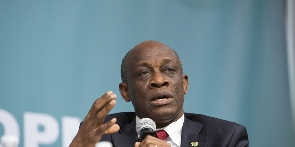 Seth Terkper, former Finance Minister
Seth Terkper, former Finance Minister
Former finance minister, Seth Terkper, is proposing to government to focus attention more on new sectors of the economy that has not been captured fairly or equitably if it wants to broaden the tax base, rather than target small businesses in the informal sector.
Government has been struggling to raise the needed revenue to undertake its obligations which include paying employee compensation and interest on loans, thereby, resulting to borrowing from both domestic and external sources – a situation that has ballooned the public debt to more than 76 percent of GDP.
To address the revenue shortfall, government introduced some new taxes in the 2021 budget to raise more money from the domestic economy. It is against this background that Mr. Terkper is saying that targeting sectors of the economy that have not been equitably captured in the tax system will better address the challenge than slapping taxes on already overburdened sectors.
For him, broadening the tax base should not only be about targeting the informal sector or taxing the old economy, i.e., sectors that have always been the main pillars of the economy, but also focusing on new but thriving sectors which are not adequately captured in the tax system.
“Taking from the angle of GDP, when you rebase, it means that you are changing the indices and giving more weight to sectors that were not in their prime when GDP was being measured. So the tax authorities should also realise that the structure of the economy is changing. Is GRA equipped to tackle that sector? Probably they are focused on the industries that are no longer viable.
For example, the timber industry was formerly huge but it is no longer the case. The services sector is the one dominating. Do the officers of GRA understand the new structure of the economy? And even in terms imports, the structure is changing. Is Customs data up to date. So, expansion of the tax base should not be in the traditional sense of going after street people only. It should be in the sense of looking at the new economy and covering it.
What I mean is equity. Equity is a very important principle in taxation. So, what I am saying is that, if you are taxing the old economy, equity requires that you tax the new economy. But you apply it in a more meaningful way based on the knowledge you have about the sector and the performance of the sector as well. We must make the tax system fairer and more equitable by taxing new sectors that have not been covered,” he said in an interview with the B&FT during the maiden PFM Tax Africa dialogue held in Accra.
Revenue target and new taxes
Government has set a revenue target of GH¢72.4 billion for the year after achieving the revised target for last year despite reduced economic activity stemming from the impact of the coronavirus pandemic on the economy.
Out of the total target, about GH¢70.9 billion is expected to be raised from domestic sources. Of this, non-oil tax revenue will constitute about 74 percent which will amount to GH¢53.6 billion, equivalent to 12.4 percent of GDP. This essentially means government aims to heavily rely on taxes as the main revenue generation strategy to address persistent shortfalls it has faced in the last four years. Hence, the budget statement has introduced new taxes and the made an upward revision of some existing ones.
Among the taxes government has introduced to achieve this target is a new tax dubbed COVID-19 Health Levy which will see a one percentage point increase in the National Health Insurance Levy and a one percentage point increase in the VAT Flat Rate to support expenditures related to COVID-19.
In addition to this, government said it is proposing a Sanitation and Pollution Levy (SPL) of 10 pesewas on the price per litre of petrol/diesel under the Energy Sector Levies Act (ESLA); and a further Energy Sector Recovery Levy of 20 pesewas per litre on petrol/diesel under the ESLA as a means of finding additional resources to cover the excess capacity charges that have resulted from the Power Purchase Agreements (PPAs).
The implementation of these two proposed levies for sanitation and pollution as well as to pay for excess capacity charges, according to the budget statement, would result in a 5.7 percent increase in petroleum prices at the pump. What it essentially means is that prices of goods and services are likely to go up as the effect of the increment will affect transport fares which will directly be passed on to consumers.
Besides these taxes, government has further slapped a financial sector clean-up levy of 5 percent on profit-before-tax of banks to help defray outstanding commitments stemming from the financial sector clean-up. The levy, the budget states, will be reviewed in 2024.
That is not all, the budget statement further added that there will be a review of existing road tolls which will be aligned with current market rates as part of the framework for promoting burden sharing as the country seeks to transform road and infrastructure sector in a post-COVID era.
Another area that government seeks to tap into for revenue is the gaming industry as it is estimated that the economy loses over GH¢300 million annually in revenue due to leakages in the sector. The gaming industry is fast gaining grounds in the country with the influx of online betting and automation.